Perception of Malaria Risk in Zanzibar: A Qualitative Study
VerifiedAdded on 2022/10/12
|6
|1222
|447
AI Summary
This article discusses the perception of malaria risk in Zanzibar and the preventive measures taken by the citizens. It also talks about the implementation of new strategies to improve the health condition and reduce the risk of vector-borne diseases.
Contribute Materials
Your contribution can guide someone’s learning journey. Share your
documents today.
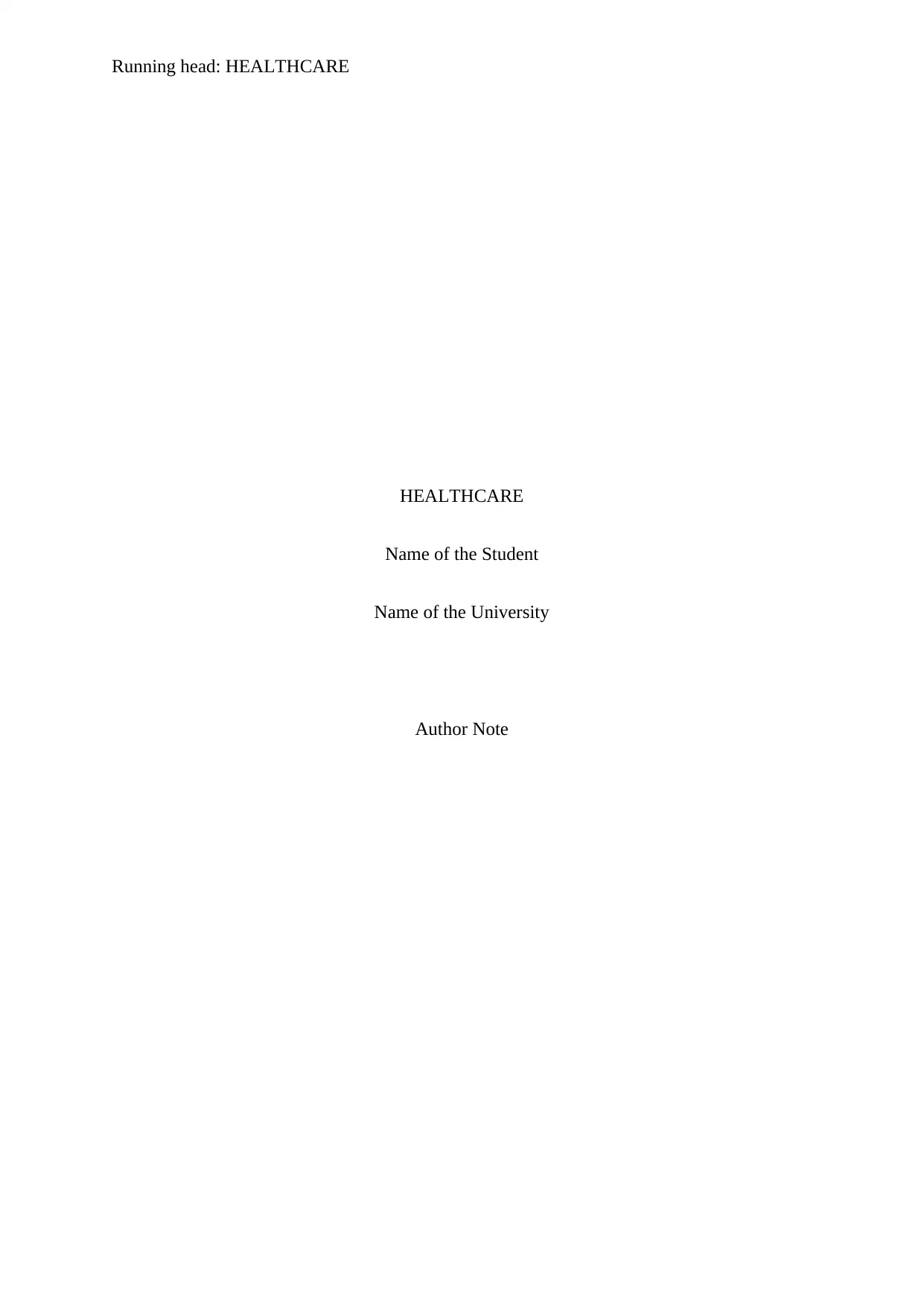
Running head: HEALTHCARE
HEALTHCARE
Name of the Student
Name of the University
Author Note
HEALTHCARE
Name of the Student
Name of the University
Author Note
Secure Best Marks with AI Grader
Need help grading? Try our AI Grader for instant feedback on your assignments.
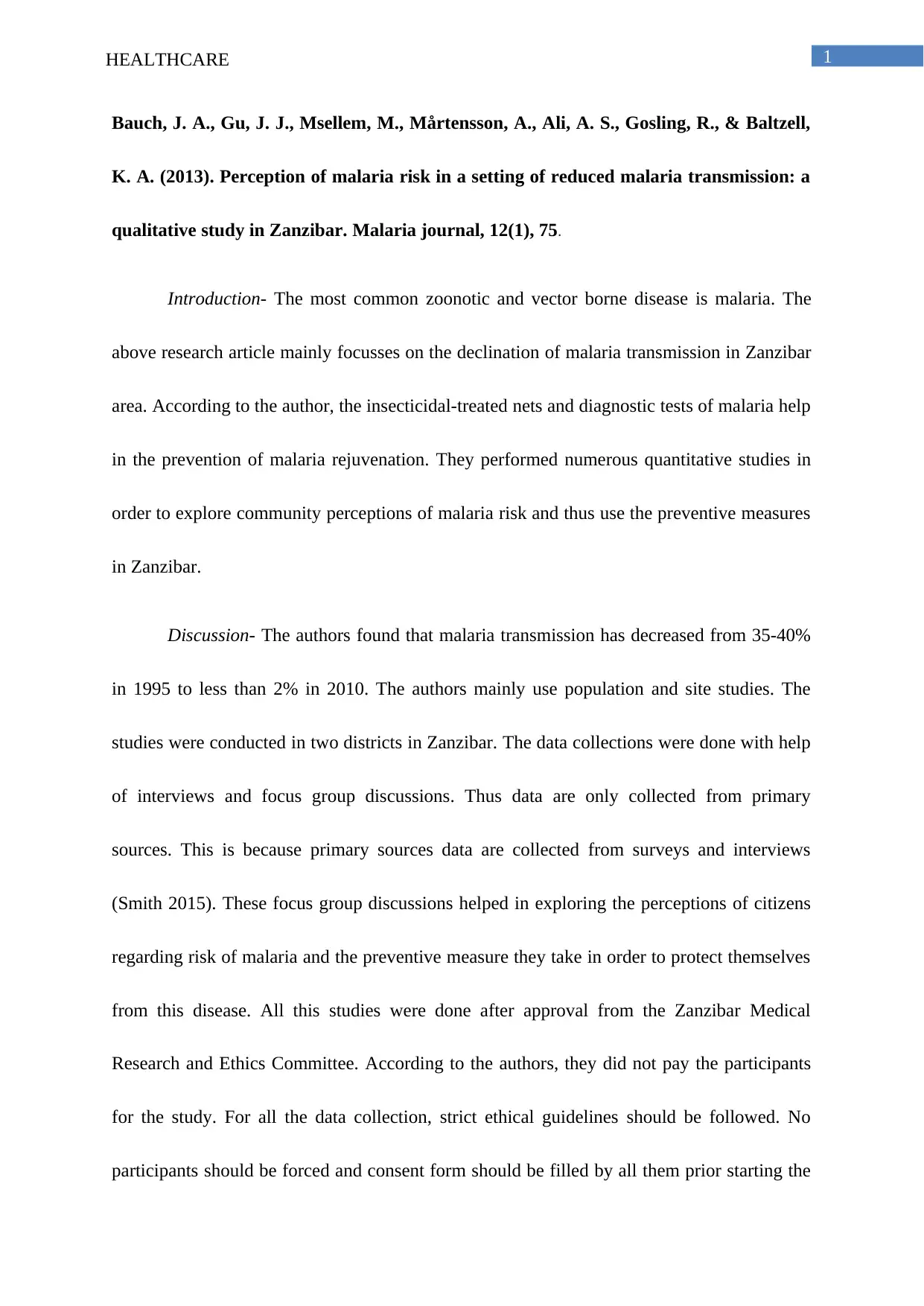
1HEALTHCARE
Bauch, J. A., Gu, J. J., Msellem, M., Mårtensson, A., Ali, A. S., Gosling, R., & Baltzell,
K. A. (2013). Perception of malaria risk in a setting of reduced malaria transmission: a
qualitative study in Zanzibar. Malaria journal, 12(1), 75.
Introduction- The most common zoonotic and vector borne disease is malaria. The
above research article mainly focusses on the declination of malaria transmission in Zanzibar
area. According to the author, the insecticidal-treated nets and diagnostic tests of malaria help
in the prevention of malaria rejuvenation. They performed numerous quantitative studies in
order to explore community perceptions of malaria risk and thus use the preventive measures
in Zanzibar.
Discussion- The authors found that malaria transmission has decreased from 35-40%
in 1995 to less than 2% in 2010. The authors mainly use population and site studies. The
studies were conducted in two districts in Zanzibar. The data collections were done with help
of interviews and focus group discussions. Thus data are only collected from primary
sources. This is because primary sources data are collected from surveys and interviews
(Smith 2015). These focus group discussions helped in exploring the perceptions of citizens
regarding risk of malaria and the preventive measure they take in order to protect themselves
from this disease. All this studies were done after approval from the Zanzibar Medical
Research and Ethics Committee. According to the authors, they did not pay the participants
for the study. For all the data collection, strict ethical guidelines should be followed. No
participants should be forced and consent form should be filled by all them prior starting the
Bauch, J. A., Gu, J. J., Msellem, M., Mårtensson, A., Ali, A. S., Gosling, R., & Baltzell,
K. A. (2013). Perception of malaria risk in a setting of reduced malaria transmission: a
qualitative study in Zanzibar. Malaria journal, 12(1), 75.
Introduction- The most common zoonotic and vector borne disease is malaria. The
above research article mainly focusses on the declination of malaria transmission in Zanzibar
area. According to the author, the insecticidal-treated nets and diagnostic tests of malaria help
in the prevention of malaria rejuvenation. They performed numerous quantitative studies in
order to explore community perceptions of malaria risk and thus use the preventive measures
in Zanzibar.
Discussion- The authors found that malaria transmission has decreased from 35-40%
in 1995 to less than 2% in 2010. The authors mainly use population and site studies. The
studies were conducted in two districts in Zanzibar. The data collections were done with help
of interviews and focus group discussions. Thus data are only collected from primary
sources. This is because primary sources data are collected from surveys and interviews
(Smith 2015). These focus group discussions helped in exploring the perceptions of citizens
regarding risk of malaria and the preventive measure they take in order to protect themselves
from this disease. All this studies were done after approval from the Zanzibar Medical
Research and Ethics Committee. According to the authors, they did not pay the participants
for the study. For all the data collection, strict ethical guidelines should be followed. No
participants should be forced and consent form should be filled by all them prior starting the
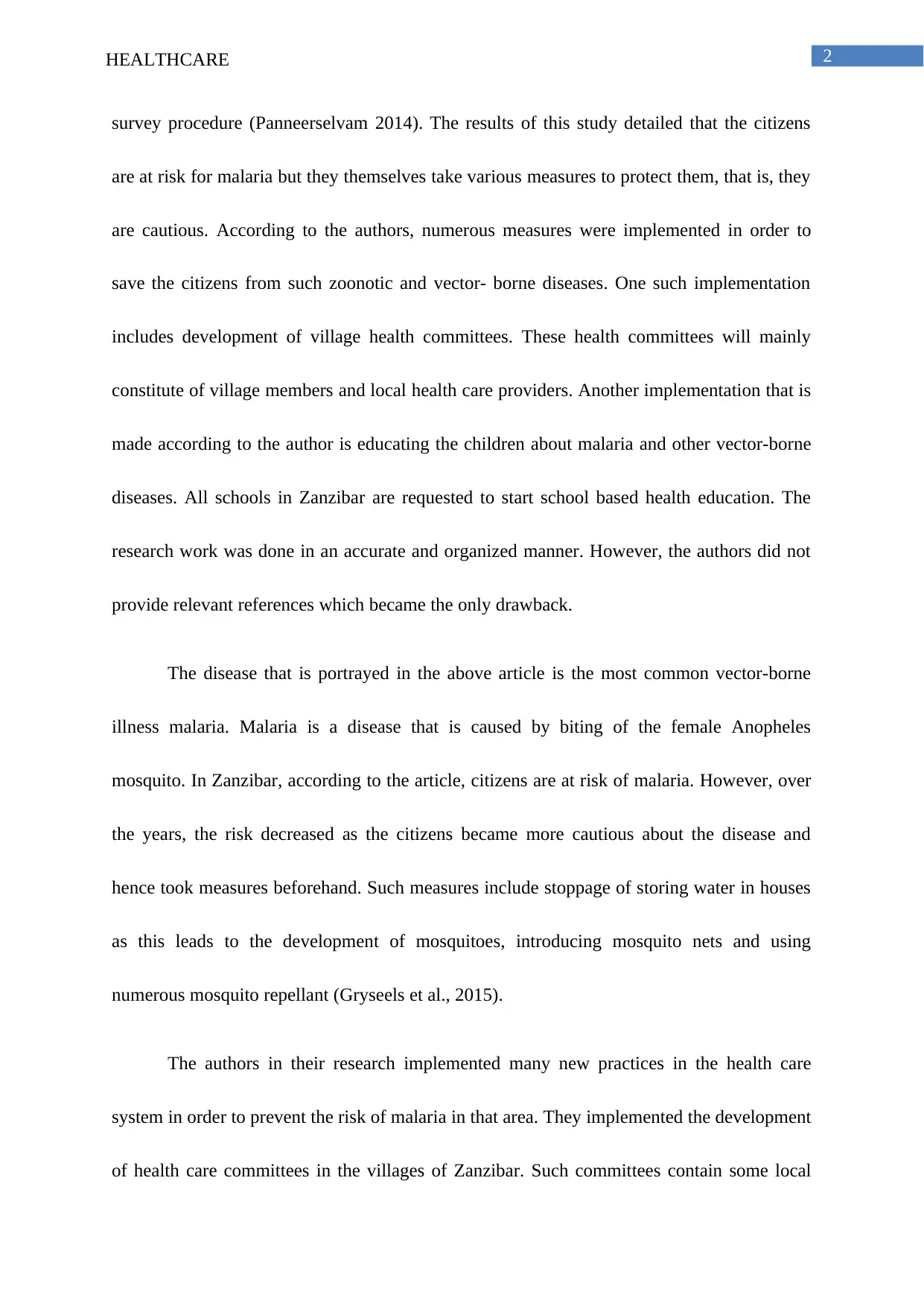
2HEALTHCARE
survey procedure (Panneerselvam 2014). The results of this study detailed that the citizens
are at risk for malaria but they themselves take various measures to protect them, that is, they
are cautious. According to the authors, numerous measures were implemented in order to
save the citizens from such zoonotic and vector- borne diseases. One such implementation
includes development of village health committees. These health committees will mainly
constitute of village members and local health care providers. Another implementation that is
made according to the author is educating the children about malaria and other vector-borne
diseases. All schools in Zanzibar are requested to start school based health education. The
research work was done in an accurate and organized manner. However, the authors did not
provide relevant references which became the only drawback.
The disease that is portrayed in the above article is the most common vector-borne
illness malaria. Malaria is a disease that is caused by biting of the female Anopheles
mosquito. In Zanzibar, according to the article, citizens are at risk of malaria. However, over
the years, the risk decreased as the citizens became more cautious about the disease and
hence took measures beforehand. Such measures include stoppage of storing water in houses
as this leads to the development of mosquitoes, introducing mosquito nets and using
numerous mosquito repellant (Gryseels et al., 2015).
The authors in their research implemented many new practices in the health care
system in order to prevent the risk of malaria in that area. They implemented the development
of health care committees in the villages of Zanzibar. Such committees contain some local
survey procedure (Panneerselvam 2014). The results of this study detailed that the citizens
are at risk for malaria but they themselves take various measures to protect them, that is, they
are cautious. According to the authors, numerous measures were implemented in order to
save the citizens from such zoonotic and vector- borne diseases. One such implementation
includes development of village health committees. These health committees will mainly
constitute of village members and local health care providers. Another implementation that is
made according to the author is educating the children about malaria and other vector-borne
diseases. All schools in Zanzibar are requested to start school based health education. The
research work was done in an accurate and organized manner. However, the authors did not
provide relevant references which became the only drawback.
The disease that is portrayed in the above article is the most common vector-borne
illness malaria. Malaria is a disease that is caused by biting of the female Anopheles
mosquito. In Zanzibar, according to the article, citizens are at risk of malaria. However, over
the years, the risk decreased as the citizens became more cautious about the disease and
hence took measures beforehand. Such measures include stoppage of storing water in houses
as this leads to the development of mosquitoes, introducing mosquito nets and using
numerous mosquito repellant (Gryseels et al., 2015).
The authors in their research implemented many new practices in the health care
system in order to prevent the risk of malaria in that area. They implemented the development
of health care committees in the villages of Zanzibar. Such committees contain some local
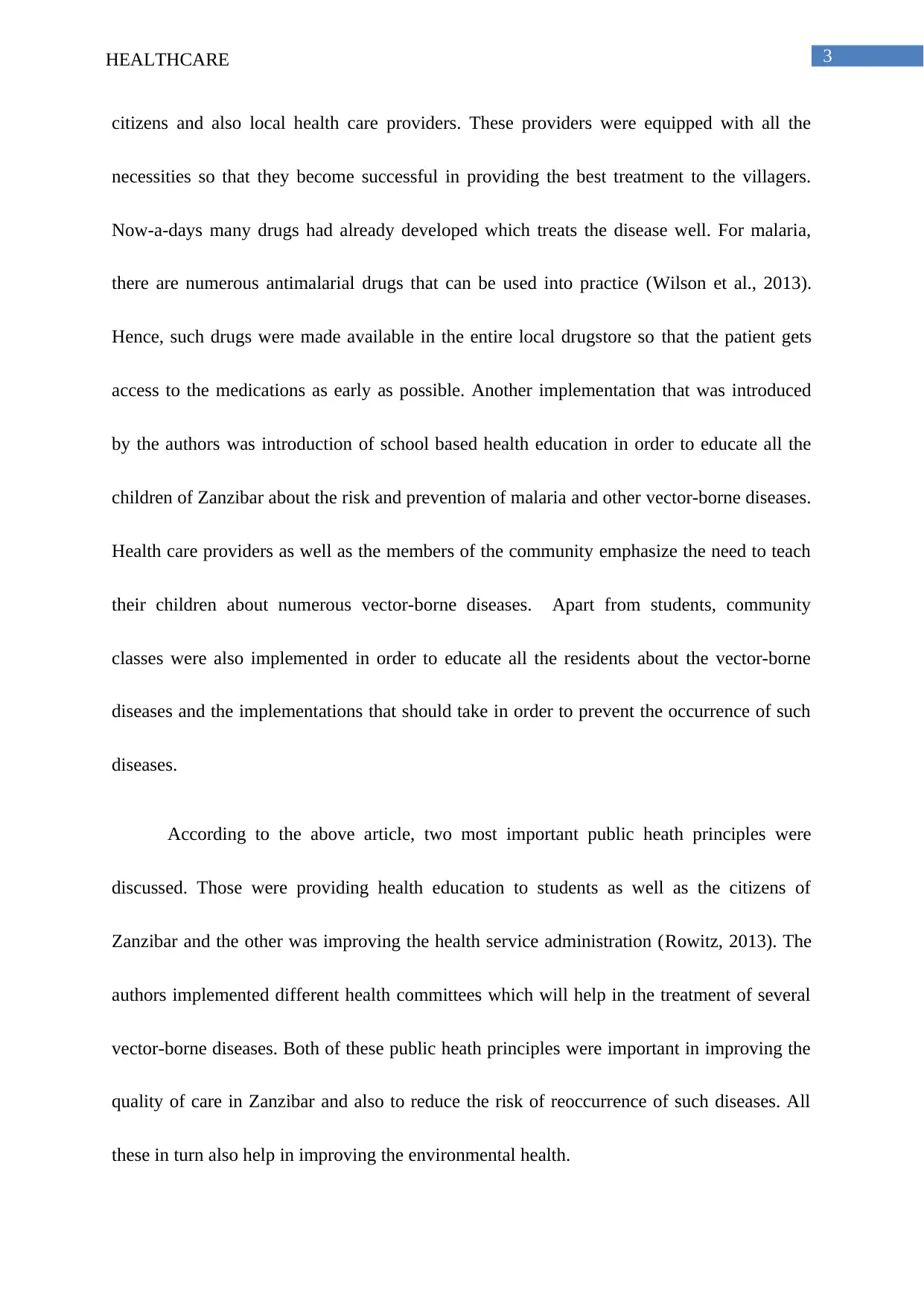
3HEALTHCARE
citizens and also local health care providers. These providers were equipped with all the
necessities so that they become successful in providing the best treatment to the villagers.
Now-a-days many drugs had already developed which treats the disease well. For malaria,
there are numerous antimalarial drugs that can be used into practice (Wilson et al., 2013).
Hence, such drugs were made available in the entire local drugstore so that the patient gets
access to the medications as early as possible. Another implementation that was introduced
by the authors was introduction of school based health education in order to educate all the
children of Zanzibar about the risk and prevention of malaria and other vector-borne diseases.
Health care providers as well as the members of the community emphasize the need to teach
their children about numerous vector-borne diseases. Apart from students, community
classes were also implemented in order to educate all the residents about the vector-borne
diseases and the implementations that should take in order to prevent the occurrence of such
diseases.
According to the above article, two most important public heath principles were
discussed. Those were providing health education to students as well as the citizens of
Zanzibar and the other was improving the health service administration (Rowitz, 2013). The
authors implemented different health committees which will help in the treatment of several
vector-borne diseases. Both of these public heath principles were important in improving the
quality of care in Zanzibar and also to reduce the risk of reoccurrence of such diseases. All
these in turn also help in improving the environmental health.
citizens and also local health care providers. These providers were equipped with all the
necessities so that they become successful in providing the best treatment to the villagers.
Now-a-days many drugs had already developed which treats the disease well. For malaria,
there are numerous antimalarial drugs that can be used into practice (Wilson et al., 2013).
Hence, such drugs were made available in the entire local drugstore so that the patient gets
access to the medications as early as possible. Another implementation that was introduced
by the authors was introduction of school based health education in order to educate all the
children of Zanzibar about the risk and prevention of malaria and other vector-borne diseases.
Health care providers as well as the members of the community emphasize the need to teach
their children about numerous vector-borne diseases. Apart from students, community
classes were also implemented in order to educate all the residents about the vector-borne
diseases and the implementations that should take in order to prevent the occurrence of such
diseases.
According to the above article, two most important public heath principles were
discussed. Those were providing health education to students as well as the citizens of
Zanzibar and the other was improving the health service administration (Rowitz, 2013). The
authors implemented different health committees which will help in the treatment of several
vector-borne diseases. Both of these public heath principles were important in improving the
quality of care in Zanzibar and also to reduce the risk of reoccurrence of such diseases. All
these in turn also help in improving the environmental health.
Secure Best Marks with AI Grader
Need help grading? Try our AI Grader for instant feedback on your assignments.
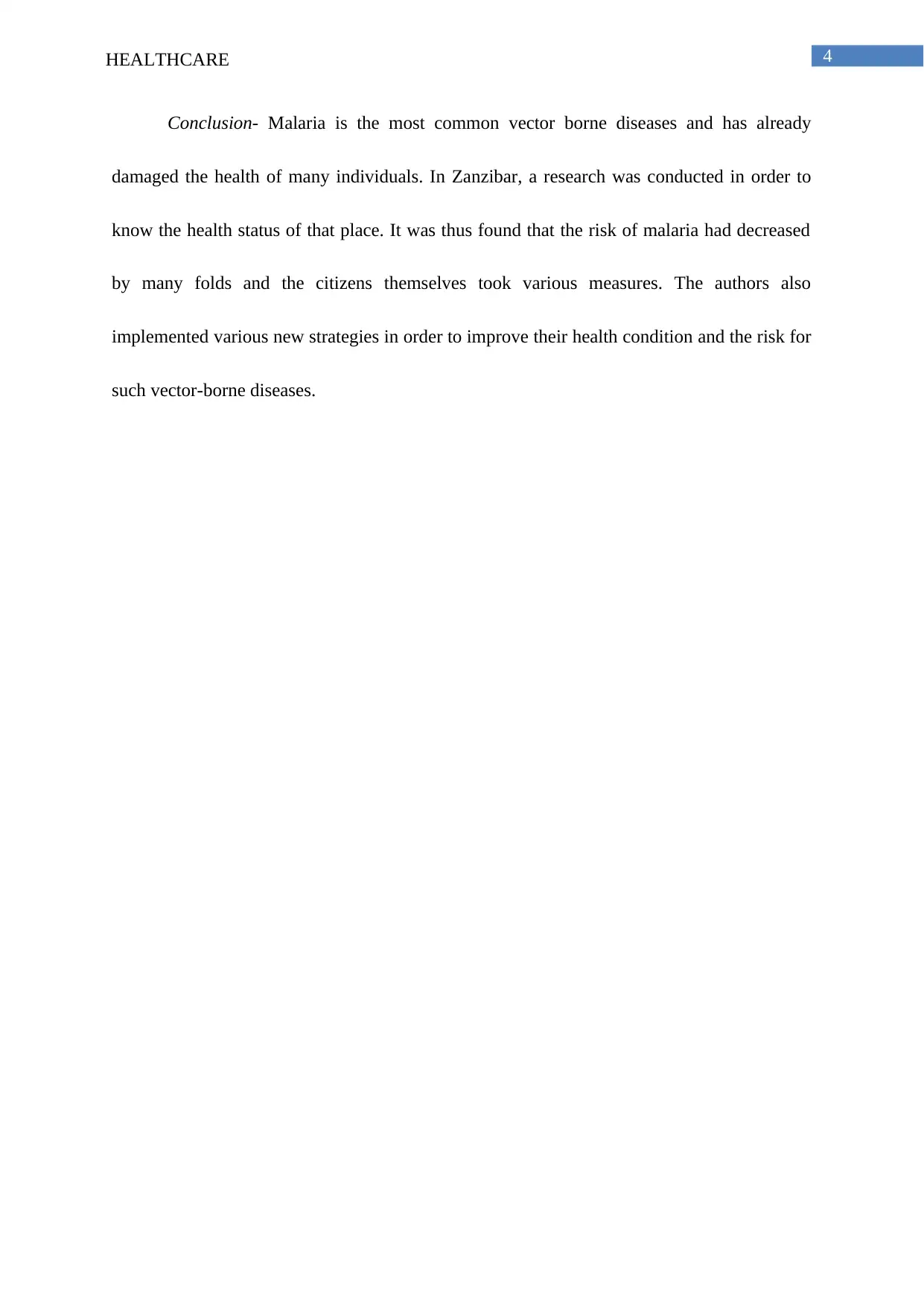
4HEALTHCARE
Conclusion- Malaria is the most common vector borne diseases and has already
damaged the health of many individuals. In Zanzibar, a research was conducted in order to
know the health status of that place. It was thus found that the risk of malaria had decreased
by many folds and the citizens themselves took various measures. The authors also
implemented various new strategies in order to improve their health condition and the risk for
such vector-borne diseases.
Conclusion- Malaria is the most common vector borne diseases and has already
damaged the health of many individuals. In Zanzibar, a research was conducted in order to
know the health status of that place. It was thus found that the risk of malaria had decreased
by many folds and the citizens themselves took various measures. The authors also
implemented various new strategies in order to improve their health condition and the risk for
such vector-borne diseases.
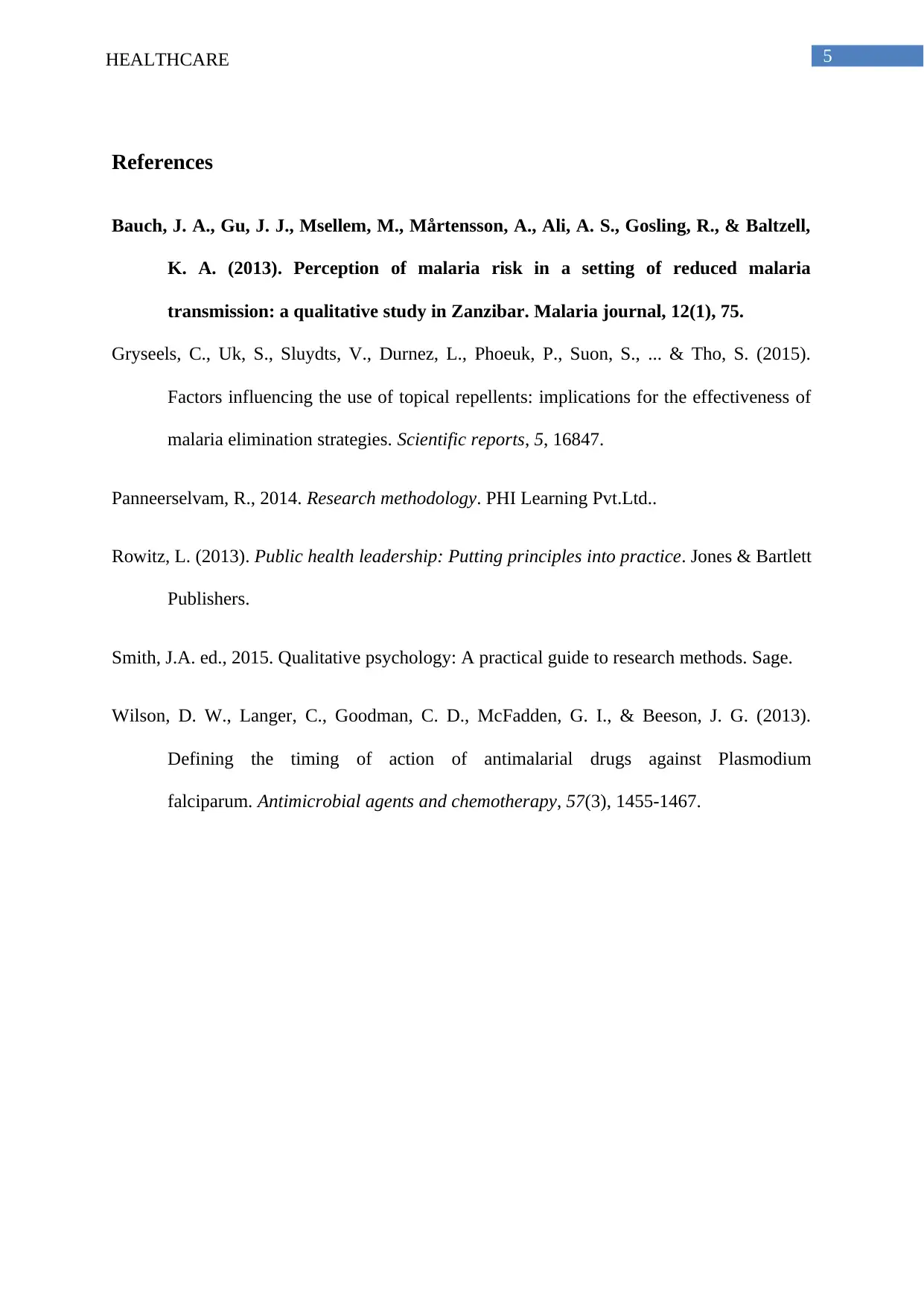
5HEALTHCARE
References
Bauch, J. A., Gu, J. J., Msellem, M., Mårtensson, A., Ali, A. S., Gosling, R., & Baltzell,
K. A. (2013). Perception of malaria risk in a setting of reduced malaria
transmission: a qualitative study in Zanzibar. Malaria journal, 12(1), 75.
Gryseels, C., Uk, S., Sluydts, V., Durnez, L., Phoeuk, P., Suon, S., ... & Tho, S. (2015).
Factors influencing the use of topical repellents: implications for the effectiveness of
malaria elimination strategies. Scientific reports, 5, 16847.
Panneerselvam, R., 2014. Research methodology. PHI Learning Pvt.Ltd..
Rowitz, L. (2013). Public health leadership: Putting principles into practice. Jones & Bartlett
Publishers.
Smith, J.A. ed., 2015. Qualitative psychology: A practical guide to research methods. Sage.
Wilson, D. W., Langer, C., Goodman, C. D., McFadden, G. I., & Beeson, J. G. (2013).
Defining the timing of action of antimalarial drugs against Plasmodium
falciparum. Antimicrobial agents and chemotherapy, 57(3), 1455-1467.
References
Bauch, J. A., Gu, J. J., Msellem, M., Mårtensson, A., Ali, A. S., Gosling, R., & Baltzell,
K. A. (2013). Perception of malaria risk in a setting of reduced malaria
transmission: a qualitative study in Zanzibar. Malaria journal, 12(1), 75.
Gryseels, C., Uk, S., Sluydts, V., Durnez, L., Phoeuk, P., Suon, S., ... & Tho, S. (2015).
Factors influencing the use of topical repellents: implications for the effectiveness of
malaria elimination strategies. Scientific reports, 5, 16847.
Panneerselvam, R., 2014. Research methodology. PHI Learning Pvt.Ltd..
Rowitz, L. (2013). Public health leadership: Putting principles into practice. Jones & Bartlett
Publishers.
Smith, J.A. ed., 2015. Qualitative psychology: A practical guide to research methods. Sage.
Wilson, D. W., Langer, C., Goodman, C. D., McFadden, G. I., & Beeson, J. G. (2013).
Defining the timing of action of antimalarial drugs against Plasmodium
falciparum. Antimicrobial agents and chemotherapy, 57(3), 1455-1467.
1 out of 6
Related Documents
Your All-in-One AI-Powered Toolkit for Academic Success.
+13062052269
info@desklib.com
Available 24*7 on WhatsApp / Email
![[object Object]](/_next/static/media/star-bottom.7253800d.svg)
Unlock your academic potential
© 2024 | Zucol Services PVT LTD | All rights reserved.
